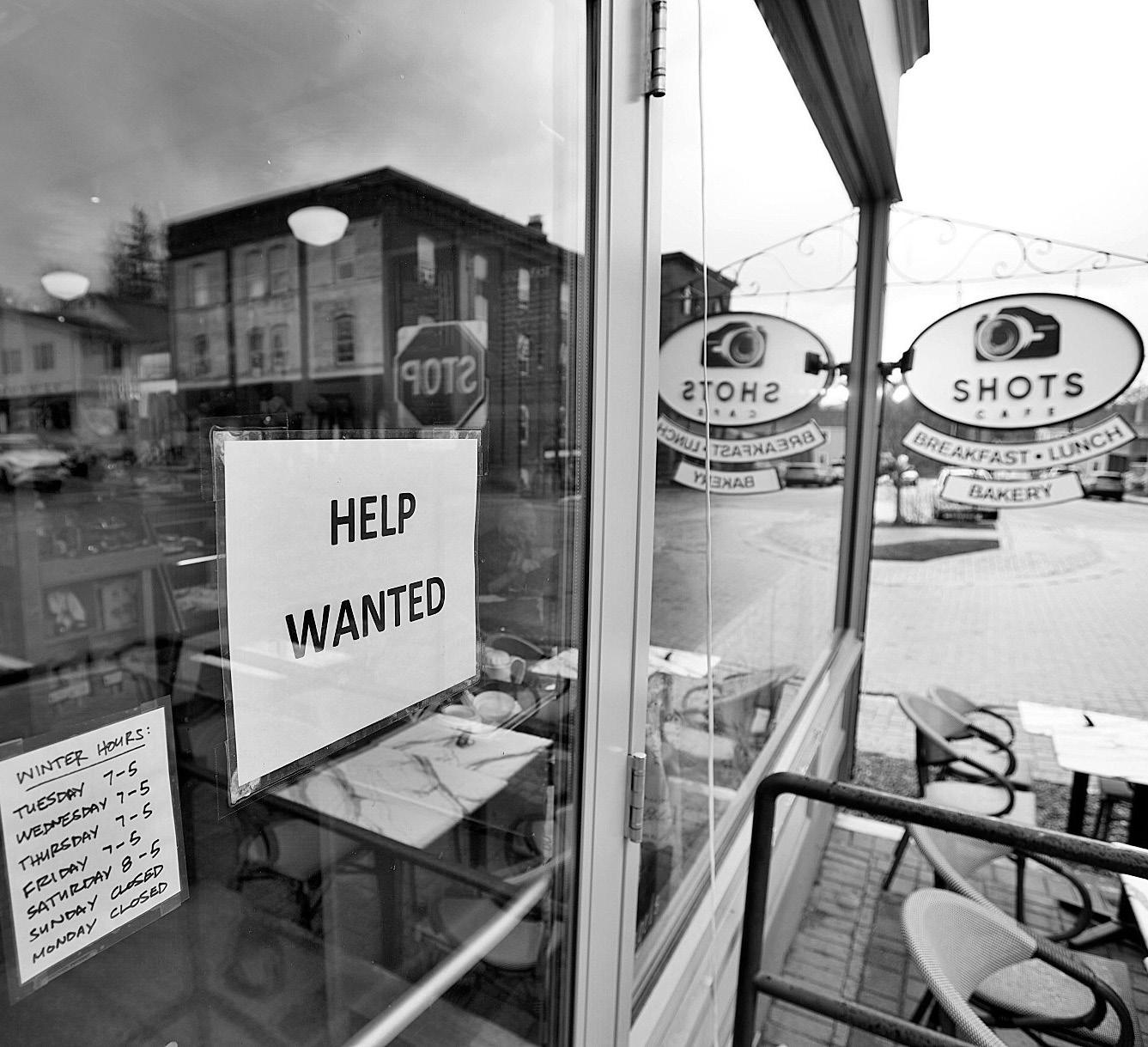
4 minute read
Hospitality industry feeling hiring crunch
As visitors flock to county, hospitality industry struggles to attract workers
By ClarenCe Fanto
With peak tourism season just around the corner, Liliana Arteaga-Tucker is racing to more than triple her staff of four at Shots Cafe in Lenox.
Most years that wouldn’t be a problem. But the pandemic changed everything.
Young applicants from New York and Boston who had moved here during the pandemic returned to the cities after the worst was over, no longer making it possible for the cafe to remain open until 9 p.m. Since then, she’s been forced to cut back to five days a week.
Currently, she only has two employees besides herself and her husband, Matthew Tucker, to help run the Housatonic Street cafe offering indoor and outdoor seating.
Arteaga-Tucker is not alone — many in Berkshire County’s hospitality cultural industry are feeling the pinch of the workforce shortage.
Hiring challenges stemming from the pandemic have been intensified by a lack of seasonal housing options, said Jonathan Butler, president/CEO of the 1Berkshire regional economic development agency. Another factor is that some young workers are seeking jobs that more closely align with their longterm career goals.
“The Berkshires continues to play catch-up with returning to pre-2020 numbers of workforce traveling here legally with work visas,” Butler said.
“Also, we are facing our own local version of the ‘great resignation’ that no region seems to fully understand.”
On top of all that, he added, “We’re in a hiring economy with almost every sector currently competing for workforce, placing greater pressure on hospitality than was felt prior to the pandemic.”
The high school and college students who traditionally compete for seasonal jobs at restaurants, inns and shops have been relatively scarce so far. And those in the job market are often seeking hourly pay rates of $20 or more.
That’s the consensus in Lenox and some other towns, especially in South Berkshire, where many restaurants are still on limited days and hours until they can hire enough people.
“Hiring is a challenge across all our business groups — and it isn’t limited to one industry,” said Max Scherff, vice president of hospitality operations at Mill Town Capital based in Pittsfield.
Mill Town’s hospitality industry holdings include Bousquet Mountain, as well as two restaurants, the Central Downtown Inn & Suites in Pittsfield and Gateways Inn & Restaurant in Lenox.
One prominent Lenox restaurateur, Whitney Ash- er, acknowledged that he has not yet set expanded days and hours for the summer season at his popular Brava and Ombra wine and tapas bars.
Describing hospitality industry hiring as always tough in the Berkshires, Asher — who is also president of the Lenox Chamber of Commerce — said that “you can find some great people with minimal experience, and a few quality people with lots of experience, but there are just not a lot of them out looking at any one time.”
Bottom line: For one opening, out of 10 candidates, one might make it through training to a regular shift. “We’ve had a little more success with wordof-mouth recruiting,” Asher said, “but it’s really just hard.”
At Shakespeare & Company Positions such as tech director, sound supervisor and sound engineers are the hardest to fill, according to Artistic Direc- tor Allyn Burrows.
“We have a lot to offer, but there’s a really high demand,” he said.
The theater troupe offers competitive pay, he added, and the company does its best to fill applicants’ salary requirements. But the organization has a budget and often the limits don’t match the marketplace.
At Loeb’s Foodtown in Lenox, summer work is often considered a rite of passage for students, said co-owner Bernie Fallon. He puts in up to 85 hours a week, seven days, at the store. The market aims to employ up to 24 people in the summer, four more than in the winter.
He welcomed the idea of the job fair, noting that the full-service market already has a year-round core of full- and part-time employees from Lenox and Lee who also pass the word to family members and acquaintances that seasonal jobs are available.
“Our hope is to add similar positive personalities for cashiers, stocking and for the deli,” he said.
BUCKING THE TREND
Some hospitality businesses said they aren’t feeling the effects of the seasonal labor shortage.
The 1896 House Inn & Country Lodgings on Cold Spring Road in Williamstown typically triples its staff for the summer and fall. Hiring more people for maintenance, to staff the front desk and do housekeeping has been going smoothly for him so far.
Hiring in general has been more challenging over the past few years, said Josh Oring, the inn’s manager, but recently it has felt less difficult. Soon, the ‘6, as it’s called locally, will ramp up hiring for the upcoming season.
“Maybe that’s where we will run into trouble,” he said.
Jim Cervone, co-owner of
Crust and Ayelada, a pizzeria and frozen yogurt shop respectively in Pittsfield, said that his businesses had a pretty consistent group of students who worked year-round. They might pick up a few extra shifts in the summer after they’re done playing lacrosse, baseball or softball, but generally the stores have the help they need.

As a frozen yogurt shop, Ayelada requires more help during the summer, Cervone said, but generally it isn’t a strain. He feels fortunate that’s the case.
He noted that other communities such as Lenox, Stockbridge and Great Barrington typically face more challenges than Pittsfield.
Year-round vs. seasonal staff
Some business owners rely heavily on year-round staff, which makes them less vulnerable to the difficulties with seasons hiring.
Jason Macioge, owner of Bistro Zinc, opened in 1999, and Betty’s Pizza Shack, since 2002, is one of them. He plans to hire several more part-time hosts and bus people, mostly college students returning from last summer.
During the pandemic Macioge paid the staff out of his own pocket. “When we were able to reopen at limited capacity, I still employed everyone at their full-time hours and it was quite costly to me personally,” he said. “I felt I was obliged to do so. People can’t live off of limited unemployment wages.”
Back at full capacity, still keeping his staff employed full-time even in the off-season, Macioge acknowledged that “it is quite costly to do so.
“But when summer rolls around I don’t have to scramble and try to hire and train new people. It is well worth the extra costs of keeping everyone on at full-time hours.”









